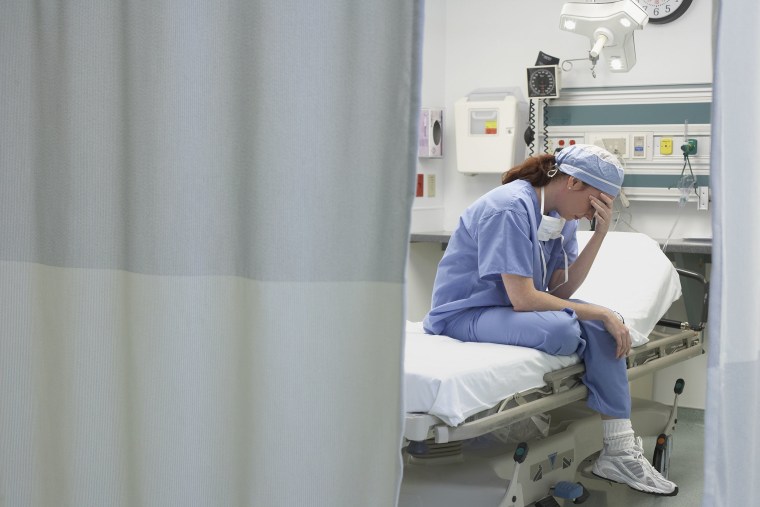It's no secret that student debt is an ever-growing crisis. Student loans have become the nation’s top category of personal debt — second only to mortgages — with borrowers owing a collective $1.5 trillion. Nationwide, 44 million Americans have taken out student loans, while a staggering 8.5 million federal student loan borrowers were in default last summer.
Default can invite severe consequences for borrowers, including garnished wages, withheld tax refunds, and a torpedoed credit score. And, though many people don't know, defaulting on student loans can even threaten a person’s career.
In 15 states, borrowers can have their occupational licenses suspended or revoked simply because they failed to pay back their student loans. That is no idle threat: A New York Times investigation “identified at least 8,700 cases in which licenses were taken away or put at risk of suspension” due to default. For instance, one nurse in Nashville, who started suffering from epileptic seizures, couldn’t work temporarily and was forced to default on her loans, which resulted in the loss of her license and thus ability to work at all.
Stripped of their licenses, borrowers essentially lose their ability to earn an honest living. That spawns a vicious cycle that makes it even more difficult to pay back the debt that triggered the loss of their licenses in the first place.
Fortunately, there is a growing, bipartisan consensus that these laws are pointlessly punitive. This month, Illinois Gov. Bruce Rauner, R, signed a bill that bans any state government agency or board from suspending, denying or revoking a person’s license simply because they defaulted on their student loans. Illinois joined Alaska and Washington, which also scrapped their default license suspension laws earlier this year.
Prior to reform, Illinois was one of the most aggressive states for enforcing its license suspension policy. According to records obtained by the Institute for Justice, Illinois suspended licenses for almost 2,300 workers across 50 occupations between 2005 and 2015, blocking credentials for more than 600 different cosmetologists, over 400 pharmacy technicians as well for barbers, counselors, nail technicians and social workers. Illinois even suspended the licenses for almost 500 different nurses, which, considering the nation’s growing nursing shortage, is a deeply warped priority.
Although the policy was originally proposed as a way to limit defaults and collect on back debts, the Illinois Department of Financial and Professional Regulation couldn’t say how much student loan debt had actually been recovered after the department had suspended a borrower’s license. Little wonder then that even the Illinois Attorney General called the license-suspension policy “nonsensical” and backed its reform.
In Congress, Sens. Elizabeth Warren, D-Mass., and Marco Rubio, R-Fla., introduced a new bipartisan bill that would dramatically curtail this disastrous policy nationwide. Their Protecting JOBs Act would ban states from suspending, revoking or denying professional licenses and driver’s licenses “solely” because a borrower defaulted on their federal student loans. States would have two years to comply by reforming their laws or else they would risk the loss of any funding received under the federal Higher Education Act.
The bill would also mark a striking reversal in federal policy: The U.S. Department of Education has previously urged states to “deny professional licenses to defaulters until they take steps to repayment.” But should the Protecting JOBs Act pass, states would be encouraged to repeal laws the federal government had wanted enacted.
These reform efforts would provide some much-needed relief to the roughly 1 million borrowers who fall into default each year, who (perhaps unsurprisingly) are more likely to be economically disadvantaged. According to a recent report by the Urban Institute, defaulters, on average, come from neighborhoods that have “less income and housing wealth” compared to the zip codes of borrowers who didn’t default on their federal student loans. Defaulters were also nearly three times as likely to have medical collections debt than non-defaulters.
Meanwhile, more Americans than ever before need a license to do their jobs. No longer limited to select professions like doctors and lawyers, today one-fourth of America’s workforce is licensed. For perspective, that figure is greater than the number of workers who are represented by a union and who earn the minimum wage, combined.
In a cruel irony, many borrowers have to take out hefty student loans to pay for the hundreds, if not thousands, of hours of classes and training required for those licensing credentials. Consider cosmetologists, whose licenses were the most frequently suspended credential in several states, including Illinois, Tennessee, and Washington. On average, a state license in cosmetology requires 386 days of coursework, which in turn typically costs upwards of $15,000. (An EMT license, in contrast, takes a mere 34 days on average.)
Those requirements impose a heavy burden on aspiring cosmetologists, who can expect to earn a median wage of less than $25,000 a year. Little wonder then that cosmetology students face a much higher risk of default than other students.
In 2012, the national default rate for student loans was 11.8 percent but, for cosmetology programs that received federal financial aid, that figure jumped to 17.1 percent. In fact, according to the U.S. Department of Education, among the 15 schools with the highest default rates for student loans, 14 of them were either cosmetology schools or barber colleges.
Losing the ability to work from unpaid student loans is alarming and counterproductive. Legislators need to end this morally bankrupt policy.
The author, a legislative analyst at the Institute for Justice, submitted a letter of support for the Protecting JOBs Act.



